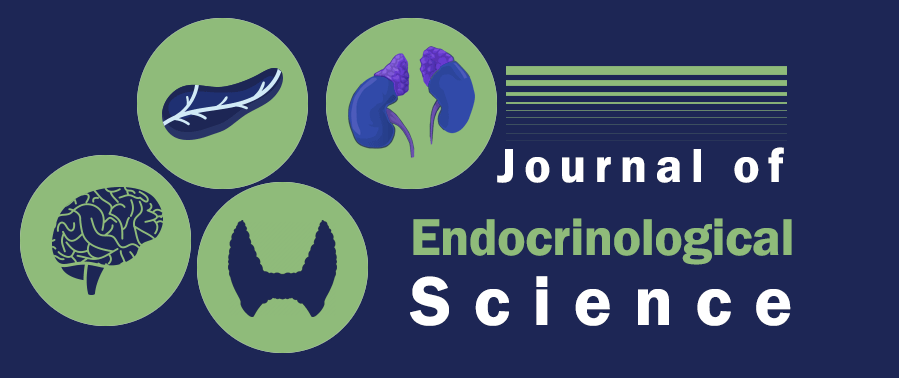Thyroid Nodules in Children and Adolescents: Mini-review
DOI: 10.29245/2767-5157/2020/1.1110 View / Download PdfCatherine E. Kerr1*, Sarah D. Hackman2, Gary L. Francis1
1Department of Pediatrics1, Endocrinology and Diabetes, University of Texas Health Science Center at San Antonio, San Antonio, TX, USA
2Department of Pathology and Laboratory Medicine2, University of Texas Health Science Center at San Antonio, San Antonio, TX, USA
Remarkable Improvement in Plaque Psoriasis with a 4 week Short Course Liraglutide Therapy in an Obese Type 2 DM Patient
Santosh Ramakrishnan1*, Mohammed Yousuf Khan1, Anantharaman Ramakrishnan2, Shanmugasundar Gopal3, Rohit Warrier4
1Consultant Endocrinologist & Diabetologist, Magna centres for Obesity, Diabetes & Endocrinology, Hyderabad, India
2Consultant Endocrinologist & Diabetologist, Magna centres for Obesity, Diabetes & Endocrinology, Bangalore, India
3Consultant Endocrinologist & Diabetologist, Magna centres for Obesity, Diabetes & Endocrinology, Chennai, India
4Consultant Diabetologist, Magna centres for Obesity, Diabetes & Endocrinology, Bangalore, India
Psoriasis is an immune mediated chronic skin disease associated with components of metabolic syndrome like obesity and type-2 diabetes. Previously, anti-diabetic drugs especially insulin sensitizers (metformin and pioglitazone) have shown positive outcomes in subjects with psoriasis1. Recently, many case series and longitudinal observational studies previously have demonstrated improvement in psoriasis with GLP1 agonist therapy when followed up for 8-12 weeks2,3. We report a patient with psoriasis and Type2 DM in whom a marked improvement in psoriasis was seen with liraglutide therapy, even with a short course of therapy for 4 weeks, which has not been previously recorded, to the best of our knowledge. This could be due to our subject possibly being a better GLP-1 responder based on baseline characteristics of relatively higher BMI and HbA1c4.
DOI: 10.29245/2767-5157/2020/1.1106 View / Download PdfHydroxychloroquine (HCQS) for glycaemic control: a remarkable turnaround in a patient with Type 2 DM
Santosh Ramakrishnan1*, Anantharaman Ramakrishnan2, Rohit Warrier3, Shanmugasundar Gopal4
1Consultant Endocrinologist & Diabetologist, Magna centres Clinics for Obesity, Diabetes & Endocrinology, Hyderabad, India
2Consultant Endocrinologist & Diabetologist, Magna centres Clinics for Obesity, Diabetes & Endocrinology, Bangalore, India
3Consultant Diabetologist, Magna centres Clinics for Obesity, Diabetes & Endocrinology, Bangalore, India
4Consultant Endocrinologist & Diabetologist, Magna centres Clinics for Obesity, Diabetes & Endocrinology, Chennai, India
We describe a case where we effectively managed chronic, uncontrolled type 2 diabetes with hydroxychloroquine (HCQS) as an add on therapy, wherein the patient was on multiple oral hypoglycemic agents along with a combination of injectable incretin/insulin therapy prior to HCQS initiation. Six months into combination therapy with HCQS, the target HbA1c was achieved for the first time in the patient’s recent history at a much lower daily insulin dose (56% requirement drop), which has never been documented before. This combination also resulted in significant weight loss. We make a case for advocating the use of HCQS to the available routine diabetes therapeutic agents, especially if the blood sugars fail to achieve target levels in spite of being on intensive management with insulin and for the obese phenotype.
DOI: 10.29245/2767-5157/2020/1.1104 View / Download PdfAdherence to Mediterranean Diet and Nutritional Status: Impact on Clinical Outcomes in Hospitalized Elderly Patients
Aurelio Lo Buglio, Francesco Bellanti, Gianluigi Vendemiale*
Centre for Aging Research - Department of Medical and Surgical Sciences, University of Foggia, Foggia, Italy
Malnutrition is associated to poor clinical outcomes, especially in hospitalized patients. High prevalence of low-grade chronic inflammation, low skeletal muscle mass, and insulin resistance are often found in malnourished patients. Increasing evidence shows how these effects can be partially reverted through an adequate intake of food or using specific dietary supplementation. In this scenario, Mediterranean Diet (MD) demonstrated positive effects on the nutritional status, with important clinical finding in hospitalized patients such as low rate of length of stay and in-hospital mortality.
The aim of this review is the summary of the main evidence about the role of Mediterranean diet on health and clinical outcomes in hospitalized elderly patients.
DOI: 10.29245/2767-5157/2020/1.1108 View / Download PdfCommentary: Emerging role of GIP and related gut hormones in fertility and PCOS
Dawood Khan, R Charlotte Moffett*
SAAD Centre for Pharmacy and Diabetes, Ulster University, Coleraine, Northern Ireland, UK
Polycystic ovary syndrome (PCOS) is a common endocrine disorder associated with infertility which affects one in ten women in the United Kingdom. Women with PCOS are typified by insulin resistance, gestational diabetes and obesity. Therefore, a close association between reproductive function and nutrition is postulated. However, regulatory pathways common to energy and reproductive function have received little attention. Recent research shows rapid amelioration of infertility, PCOS and type 2 diabetes following Roux-en-Y bariatric surgery (RYGB). This occurs prior to weight loss suggesting involvement of gut derived factors. Therefore, gut hormones emerge as key players in the regulation of both energy homeostasis and possibly reproductive function. Alteration of gut peptide levels including GLP-1, GIP, PYY, ghrelin, NPY and neurotensin post-bariatric surgery suggest a plausible mechanism behind beneficial effects of RYGB. Furthermore, expression of gut peptide receptors within the reproductive axis strengthen the idea of involvement of these hormones in the remission of fertility post-surgery. The present commentary discusses the role of these important gut peptides and their receptors in the regulation of female reproductive system in the light of a recent article published by our laboratory. Understanding the functional relationship between the gut and reproductive axis will help us to identify novel and less invasive alternatives to bariatric surgeries for reproductive and related metabolic disorders.
DOI: 10.29245/2767-5157/2020/1.1109 View / Download Pdf